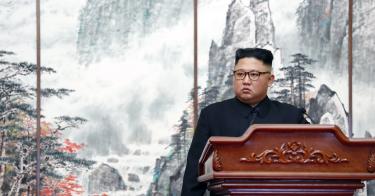Having built up his nuclear and missile arsenal during the past four years, North Korean strongman Kim Jong-un has just warned President-elect Biden to expect more of the same.
Speaking at the 8th Party Congress, the country’s highest legislative event, Kim praised his munitions scientists for their advances and announced plans for yet more dangerous weapons. These programs likely entail more missile and nuclear testing, which will escalate tensions and pose an early foreign policy challenge for the Biden administration.
Kim highlighted the strides North Korea has made in recent years, developing thermonuclear hydrogen bombs, ICBMs that can reach the continental United States, the world’s largest road-mobile ICBM launcher, extensive new tactical missile and conventional weapons, and more. In 2019, Pyongyang revealed five new missile systems and set a new record for missile launches in a year, all of which were violations of UN resolutions. Last October’s military parade revealed more new weapons than any previous parade.
Not resting on his laurels, Kim declared an ambitious development program that poses even greater risk to the United States and allies South Korea and Japan. The regime vowed to produce solid-fuel ICBMs with multiple warheads to be fired from land- and sea-based platforms, to improve the accuracy of preemptive and retaliatory nuclear attacks on targets 15,000km away, and to develop smaller, lighter nuclear weapons for tactical missile systems.
Coupled with North Korea’s new ability to produce mobile ICBM launchers enabling more missiles to disperse to covert launch positions, the regime could overwhelm limited U.S. missile defenses protecting the American homeland. Kim also announced plans to develop a nuclear-powered submarine and hypersonic glide missiles that could evade missile defenses.
His speech dashed hopes that a new U.S. administration or Seoul’s recent obsequiousness would moderate the regime’s behavior and provide an opportunity for resuming negotiations. North Korea remains as defiant as ever against complying with 11 UN resolutions requiring it to abandon its nuclear and missile programs.
Pyongyang declared it wouldn’t change its policy regardless of who is in the White House. Kim conditioned resuming denuclearization negotiations on the U.S. abandoning its “hostile policy.” Doing so would require the United States to capitulate to an extensive list of military, diplomatic, economic, and law enforcement demands.
Kim also harshly criticized South Korea, despite President Moon Jae-in’s repeated efforts to curry favor. The Moon administration has offered extensive economic benefits, overlooked North Korean threats and insults, and recently enacted legislation to constrain South Korean freedom of speech in response to Pyongyang’s demands.
South Korean Minister of Unification Lee In-young had predicted that North Korea would offer a “positive message of dialogue and cooperation.” Instead, Kim Jong-un declared that inter-Korean relations had returned to the tense period before the 2018 Panmunjom inter-Korean summit declaration, which Moon had proclaimed at the time as a breakthrough in reducing tensions on the peninsula.
Pyongyang dictated conditions that Seoul must adhere to, including suspending combined military drills with Washington and reducing South Korea’s planned military modernization plans. Kim left responsibility for future dialogue prospects firmly with Seoul, declaring there was no longer need for the regime “to show our goodwill unilaterally like in the past.”
Despite the rebuke, the Moon administration quickly reaffirmed its “unwavering will to implement inter-Korean agreements,” stressed “mutual trust and respect,” and eagerly promised to meet “anywhere, anytime.”
North Korea provocations are a given, but their scope and timing are less predictable. Pyongyang typically engages in highly provocative behavior such as nuclear or missile tests early in new U.S. and South Korean administrations to “train them like a dog” (as one defector put it). North Korea’s dire economic conditions – brought on by self-imposed COVID restrictions, sanctions, natural disasters, and decades of ill-fated socialist economic policies – provides an incentive for the regime to raise tension in order to garner rewards for returning to the status quo ante. Such tactics have often succeeded in the past.
But such antics might be delayed this time due to COVID. Previous threatening actions were intended to force Washington back to the negotiating table or offer yet more concessions. But if North Korean diplomats are unable or unwilling to meet with U.S. counterparts due to COVID restrictions, that could delay the usual regime game plan.
The Biden administration should remain open to diplomacy, but learn from the mistakes of past agreements. Progress at working level meetings should precede any future summits with the final result being a comprehensive agreement clearly delineating all parties’ responsibilities and including rigorous verification. Implementing such an agreement would take time and need to be done incrementally.
In the meantime, Biden should maintain America’s strong alliance with South Korea, explore missile defense options for the U.S. and its allies, and respond firmly to any violations of UN resolutions. The U.S. did not respond to any of North Korea’s missile violations in 2019 and 2020.
Kim Jong-un has signaled that he has no intention of treating the new U.S. president any better than his predecessors. As Pyongyang tries to force its way higher on Biden’s foreign policy agenda, it will continue to augment its ability to threaten the United States, South Korea, and Japan with nuclear weapons. Last year was relatively quiet in U.S.-North Korean relations. That is likely to change.
This piece originally appeared in Defense One



